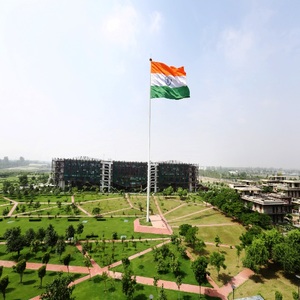Australia Recognises Jindal Global Law School's Law Degree
 JGLS students have more global career prospects now with the Law Council of Australia (LCA) and the Law Admissions Consultative Committee (LACC) recognising their LLB degree under Uniform Principles for Assessing Qualifications of Overseas Applicants for Admission to the Australian Legal Profession.
JGLS students have more global career prospects now with the Law Council of Australia (LCA) and the Law Admissions Consultative Committee (LACC) recognising their LLB degree under Uniform Principles for Assessing Qualifications of Overseas Applicants for Admission to the Australian Legal Profession.
This opens new opportunities for them to pursue a career in Australia. Indian and Australian legal systems share much in common. Both countries are democracies with a federal system of government. Even some sections of Indian constitution are similar to those in Australian constitution.
In addition, the globalised nature of legal profession means that Indian and Australian lawyers can increasingly work together on corporate matters involving multiple jurisdictions. However, despite these similarities, opportunities for Indian lawyers to work in Australia have been few.
JGLS and the Centre for India-Australia Studies (CIAS) of O.P. Jindal Global University have been working together to create such opportunities. The CIAS is the first-of-its-kind focusing on India-Australia relations located within an Indian higher education institution. Since its inauguration last year by the Australian High Commissioner, the CIAS has created opportunities for young Indians and Australians to get exposure through short-term exchange programmes.
The CIAS has also finalised partnerships with Australian law firms and government departments which will allow students to gain much-needed work experience in Australia. Two JGLS students recently completed an internship at Mitry Lawyers in Sydney and found the experience to be invaluable.
Professor (Dr.) C. Raj Kumar, Founding Vice-Chancellor of O.P. Jindal Global University (JGU) and Dean of JGLS, said: “Providing international career opportunities to students is a part of our vision at O.P. Jindal Global University. We are working to create awareness and provide access for students to work in Australia. The recognition of our world-class degree programme by the LCA is a welcome step that we must celebrate.”
Mr Duncan Bentley, Member of the LCA’s Legal Education Committee and Deputy Vice-Chancellor (Academic) at Swinburne University of Technology, said: “This is a visionary approach to prepare Indian lawyers for practicing in an increasingly-globalised profession. India and Australia share a strong common law heritage. I am delighted that Jindal Global Law School has taken initiative to achieve recognition for its qualifications.”
Mr Shaun Star, Executive Director of CIAS at JGU and Assistant Dean at JGLS, said: “Indian students are required to complete 11 subjects in Australia after completing an under-graduate law degree. This can sometimes take years. JGLS graduates will need to complete only four prescribed subjects and undergo practical legal training to become a qualified practicing lawyer in Australia.”

